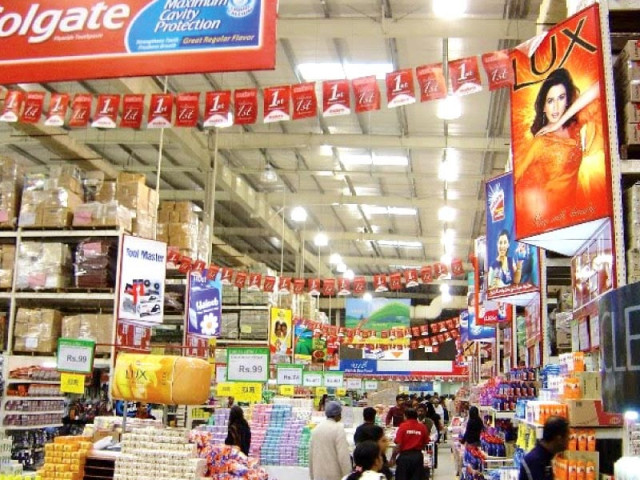Consumer patterns: Retail stores witness mixed trends
Hyperstar sales flourish, market leader Metro growth stabilises.

Despite sluggish economic growth, leading super market chains – that mainly cater to middle and upper income classes – have witnessed moderate to significant growth in consumer spending recently.
“We have seen a significant increase in the number of customers as well as the size of their baskets,” Hyperstar’s Vice President Development, Mubashir Jalili said. “Spending increased in general – both food and non-food items,” he added.
Citing reasons, Jalili said people’s buying power has increased for multiple reasons. The government has increased salaries while property – real estate – prices also went up, he said, resulting in more disposable cash for those who sold their properties recently.
Hyperstar, subsidiary of Majid al-Futtaim Group, launched from Lahore in 2009 and opened shop in Karachi at the end of 2011.
The record increase in overseas workers’ remittances and gains at the stock markets are other possibilities for the increase in consumer buying power, Jalili said.
Remittances sent by overseas Pakistanis crossed $13 billion for the first time in the country’s history in fiscal year ending June 30, 2012, a growth of more than 17% when compared with $11.2 billion of the corresponding period. Meanwhile, the Karachi Stock Exchange (KSE) 100-share index crossed the 15,000 point mark on August 17, a level last hit in May 2008.
While Hyperstar saw a noticeable increase in consumer spending – in grocery, textile and other items – other retailers said they witnessed only slight to moderate growth and that, too, in food items mainly.
“There was a slight improvement in some areas but nothing significant,” said Metro Cash and Carry Director Corporate Communications Pervaiz Akhtar.
Akhtar said they observed growth in edible grocery but non-food items didn’t grow as such. “People can’t compromise on essentials but they can reduce spending on non food items – electrical appliances and luxuries,” he said. “The main impact of the economic slowdown is on non-food items,” he said.
Germany-based Metro has been operating in Pakistan since 2007. Following its merger with Makro Habib Cash and Carry, it became the largest supermarket chain in Pakistan having a network of ten stores in Karachi, Lahore, Faisalabad and Islamabad.
If one looks at numbers, they are better than last year,” Akhtar said. However, if one adjusts the impact of inflation, the overall spending trend remained the same as it was last year, he added – that’s despite the reduction in the Consumer Price Index (CPI) – a primary measure of inflation – which dropped from 12.4% in July 2011 to 9.6% in July 2012 on year-on-year basis. The food inflation, for the same period, dropped significantly from 17.1% to 9.1% on a yearly basis.
The market has become very competitive and no one can afford to make mistakes, said Arif Naqi, Chief Executive Establishment at Imtiaz Super Market. One has to have proper strategy and competitive prices to retain customers. “We have seen slight increase on the grocery side but it is not noticeable. As far as Ramazan sales are concerned, they increase anyway especially in grocery, dates, beverages and clothing,” he added.
While retailers have witnessed some growth in the consumer spending – particularly in edible grocery – it doesn’t reflect the nationwide increase in consumer spending or economic recovery, said Managing Director of Emerging Markets Research Muzammil Aslam.
The economist said consumer spending pattern in Pakistan – where half the economy is undocumented – cannot be considered as a measurement for economic recovery. These supermarkets cater to metropolitan areas thus it does not paint the overall picture of the economic recovery, he said.
Real estate prices have increased recently, prices of wheat and maize also increased in international markets, Aslam said, but on the flip side no new projects have come in the country – the economy grew to 3.7% in fiscal 2012 compared with 3% of fiscal 2011, however, it remained lower than target of 4.2%.
Published in The Express Tribune, September 2nd, 2012.



















COMMENTS
Comments are moderated and generally will be posted if they are on-topic and not abusive.
For more information, please see our Comments FAQ